Etchings Institutions search term: wunderlich
Drury Lane | ||
| Number: | 243 | |
| Date: | 1880/1881 | |
| Medium: | etching | |
| Size: | 164 x 103 mm | |
| Signed: | butterfly at upper right | |
| Inscribed: | no | |
| Set/Publication: | 'Second Venice Set', 1886 | |
| No. of States: | 1 | |
| Known impressions: | 26 | |
| Catalogues: | K.237; M.234; W.176 | |
| Impressions taken from this plate (26) | ||
TECHNIQUE
This is pure etching, with no drypoint. It was etched lightly for the distant street view, then this area was 'stopped out' and the rest was etched much more deeply for the foreground, which was drawn confidently with long lines and dynamic zigzags for the archway, and sketched quickly with shorter, broken lines for the barely indicated children.
PRINTING
Drury Lane was published by Messrs Dowdeswell and Thibaudeau with A Set of Twenty-six Etchings (the 'Second Venice Set') in 1886. When Whistler was satisfied with this etching, he sent the copper plates to the publishers, who arranged for a selection to be printed by Émile Frédéric Salmon (1840-1913) for Messrs Dowdeswell, including Drury Lane ( ). However, Whistler then decided to print them himself.
). However, Whistler then decided to print them himself.
 ). However, Whistler then decided to print them himself.
). However, Whistler then decided to print them himself.There are numerous dockets, receipts and lists recording the printing and delivery of the edition. Two impressions of Drury Lane were delivered on 2 April, ten on 28 July, four on 25 September 1886; nineteen on 15 January 1887, making a total of 35. 5
5: Whistler to W. Dowdeswell, [16 July 1887], GUW #08717.
It was printed sometimes in black ink, including, for example, an untrimmed early impression on buff laid paper ( ) and a later one on cream Asian laid paper, trimmed to the platemark, as were most impressions, and signed on the tab with a butterfly and 'imp.' to show that Whistler had printed it (
) and a later one on cream Asian laid paper, trimmed to the platemark, as were most impressions, and signed on the tab with a butterfly and 'imp.' to show that Whistler had printed it ( ). Even a cancelled impression, printed in dark brown ink on light-weight, western, possibly faux-Asian paper, was signed by Whistler with his butterfly and 'imp.' under the platemark, for it was not trimmed (
). Even a cancelled impression, printed in dark brown ink on light-weight, western, possibly faux-Asian paper, was signed by Whistler with his butterfly and 'imp.' under the platemark, for it was not trimmed ( ). More usually it was printed in dark brown ink on laid papers including ivory (
). More usually it was printed in dark brown ink on laid papers including ivory ( ,
,  ); buff (
); buff ( ) and cream laid papers (
) and cream laid papers ( ). It was not usually printed on watermarked paper.
). It was not usually printed on watermarked paper.
 ) and a later one on cream Asian laid paper, trimmed to the platemark, as were most impressions, and signed on the tab with a butterfly and 'imp.' to show that Whistler had printed it (
) and a later one on cream Asian laid paper, trimmed to the platemark, as were most impressions, and signed on the tab with a butterfly and 'imp.' to show that Whistler had printed it ( ). Even a cancelled impression, printed in dark brown ink on light-weight, western, possibly faux-Asian paper, was signed by Whistler with his butterfly and 'imp.' under the platemark, for it was not trimmed (
). Even a cancelled impression, printed in dark brown ink on light-weight, western, possibly faux-Asian paper, was signed by Whistler with his butterfly and 'imp.' under the platemark, for it was not trimmed ( ). More usually it was printed in dark brown ink on laid papers including ivory (
). More usually it was printed in dark brown ink on laid papers including ivory ( ,
,  ); buff (
); buff ( ) and cream laid papers (
) and cream laid papers ( ). It was not usually printed on watermarked paper.
). It was not usually printed on watermarked paper.
